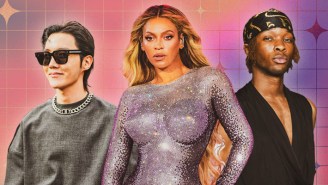“Why is a nice literary old lady like me,” Margaret Atwood asks in the opening of Angel Catbird (Dark Horse), “messing around with flying cat-owl superheroes?” Atwood is gently teasing, to some degree. Anybody who’s followed her career knows that while Atwood may have a pile of awards and be taken seriously as an author, she’s never cared a whit about what a “Great Author” is supposed to do. In fact she’s made much of her career ignoring conventional wisdom. Hence, she’s written her first comic book, an unusual mix of pulpy Golden Age origin story, manga, and educational comic.
The concept of the book is pretty straightforward: Our hero, a brilliant biochemist, is looking for a genetic resequencing chemical courtesy of the rat-like Doctor Muroid. Exposed to both the DNA of a cat and an owl, he becomes Angel Catbird, a chimeric superhero torn between his different natures, helped in part by the secret society of cat people he stumbles into. Along the way, the book chimes in with helpful, if random, facts about animal safety.
Johnny Christmas’ art is at its most detailed when we see Angel Catbird in action, which can make the human sequences occasionally feel a little bland, and his manga-esque style can clash at times with the Golden Age tone. But Atwood is clearly having a ball exploring a new medium, and the book often feels a bit like a story straight from the age of mystery men and pulp heroes being put on the page in four colors. Her enthusiasm is infectious, especially if you’ve got an affection for that era of comics. Angel Catbird might be a tough sell to both Atwood’s more literary fans and comic book readers used to grittier heroes. But if you’re willing to roll with Atwood’s cheery disregard for what “should” be done, you’ll have a ball.
Kill or Be Killed #2, Image Comics
Ed Brubaker, Sean Phillips, and Elizabeth Breitweiser continue their superb mix of old-school horror and vigilante justice. Dylan, our not entirely stable protagonist, has one day to find and kill a “bad person” for the demon that’s supposedly making him sick. What Phillips and Brubaker leave unanswered, of course, is just whether this demon is real, but that smartly lurks in the background in a story about forgotten memories, guilt, and unfinished business. It turns out Dylan does, in fact, know somebody bad enough to die, and just how he knows this makes up the bulk of the story.
Brubaker and Phillips smartly keep the book grounded. There’s a hilarious exchange between Dylan and his weed dealer, for example, that blows all the crime movie tropes about buying guns illegally out of the water. There’s nothing Dylan does that you’d find incredible, although “moral” and “right” are another matter entirely. It makes for a book with an uncomfortably sharp edge, and a welcome addition to Brubaker and Phillips’ long series of collaborations.
The Flintstones #3, DC Comics
Mark Russell and Steve Pugh’s twist on Bedrock’s modern stone age family has been to inject the book with a lot of dark comedy. That tendency amps up with this issue’s explanation of just why the Great Gazoo hangs out with cavemen. It turns out aliens are as much a pack of jerks as humans, and the discovery of Earth goes poorly for Bedrock once alien teenagers show up for “Galactic Break.”
Russell, along the way, touches on one of the book’s more interesting aspects as well: The idea of Fred as a war veteran just trying to get through another day with his marbles in one place. While the Hanna Barbera stylings may soften things slightly, and Russell and Pugh’s mastery of deadpan absurdity can make bits like a suicidal veteran accepting being put on hold as long as the music is good funny instead of bleak, the book still has some pointed, and necessary, things to say about how veterans are treated. It’s not what you’d expect from The Flintstones, but in the best possible sense.
Great Divide #1, Dynamite
Ben Fisher and Adam Markiewicz deliver a book with a fairly intriguing premise: A plague of some sort makes any contact between humans a death sentence. Needless to say, this wrecks society at lightning speed, but the book only uses that as background for a look at how people handle a world where everybody knows the species is ending. It’s a bit more conventional than perhaps the idea merits; why, for instance, hasn’t artificial insemination caught on. But it’s a fast-moving book with a smart idea, and those are always worth reading.
Glitterbomb #1, Image Comics
Kudos to Jim Zub and Djibril Morissette-Phan, who don’t mess around with this new book. We no sooner meet Farrah, middle-tier actress seeing her career end at 40, getting berated by her agent for not being beautiful enough, than she eats his brain with her tongue. We assure you, that’s not a metaphor. Farah, we quickly learn, has something much darker in her than just the pain of being forcibly washed-up by Hollywood, something the book uses as a less than subtle visual metaphor at one point.
Still, Zub’s unexaggerated take on Hollywood ugliness and Morissette-Phan’s grounded artwork combine to make for an unusual take on the eldritch horror tale. Led by Fred Van Lente’s Weird Detective, we’re seeing some fresh takes on the Lovecraftian horror story, and this has promise to be an excellent addition to the trend.
Moon Knight #6, Marvel: A new arc kicks off with three different artists tackling our hero’s increasingly fractured psyche, which comes out in some, let’s call them unusual, ways.
Giant Days #18, BOOM! Studios: The delightful, gentle romantic comedy about three English girls in their freshman year of college ends on the perfect note.
A&A: The Adventures of Archer & Armstrong #7, Valiant: Rafer Roberts, Mike Norton, and David LaFuente have an elaborate and ridiculous excuse to have their heroes beat up clowns, communists, and Communist clowns, and as you might have guess the whole venture is treated with absolutely the comedic sensibility it merits. You likely won’t laugh harder at a book this week.
Poe Dameron #6, Marvel: This book’s light-as-a-feature adventure sensibility serves it well as it pays off its first arc in hilarious style.
Supergirl #1, DC Comics: Supergirl’s new book cleverly turns the “superhero as teen” story on its head. Kara doesn’t fit in because she really is smarter and better than all the other kids. Her struggle is not being a jerk about it. It’s a clever way to emphasize her scientific skills while pushing her away from being just a distaff Superman, and it’ll be exciting to see what the book has coming next.
This Week’s Collections
Carver: A Paris Story, Z2 (Softcover, $15): Chris Hunt’s story of a WWI-era Marine sucked into the Parisian underworld is a bit rough around the edges, technically speaking, but the crisp art and fun story make it stand out.
Kill Six Billion Demons, Image (Softcover, $15): The bizarre fantasy webcomic finally gets a collection, complete with background on its amusing, strange universe.
Batman by Scott Snyder and Greg Capullo, DC Comics (Hardcover, $50): If, for some reason, you’ve yet to get caught up on Snyder and Capullo’s epic run on Batman, DC has the first three volumes in paperback with a nice slipcover to go with it, just in time for Batman Day.






